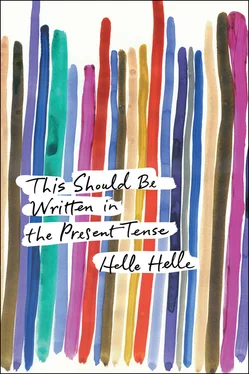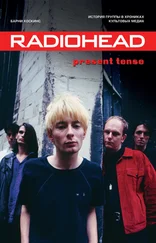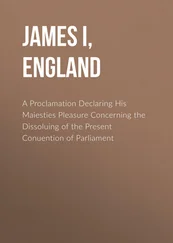Helle Helle - This Should Be Written in the Present Tense
Здесь есть возможность читать онлайн «Helle Helle - This Should Be Written in the Present Tense» весь текст электронной книги совершенно бесплатно (целиком полную версию без сокращений). В некоторых случаях можно слушать аудио, скачать через торрент в формате fb2 и присутствует краткое содержание. Год выпуска: 2015, ISBN: 2015, Издательство: Soft Skull Press, Жанр: Современная проза, на английском языке. Описание произведения, (предисловие) а так же отзывы посетителей доступны на портале библиотеки ЛибКат.
- Название:This Should Be Written in the Present Tense
- Автор:
- Издательство:Soft Skull Press
- Жанр:
- Год:2015
- ISBN:9781619027626
- Рейтинг книги:5 / 5. Голосов: 1
-
Избранное:Добавить в избранное
- Отзывы:
-
Ваша оценка:
- 100
- 1
- 2
- 3
- 4
- 5
This Should Be Written in the Present Tense: краткое содержание, описание и аннотация
Предлагаем к чтению аннотацию, описание, краткое содержание или предисловие (зависит от того, что написал сам автор книги «This Should Be Written in the Present Tense»). Если вы не нашли необходимую информацию о книге — напишите в комментариях, мы постараемся отыскать её.
This Should Be Written in the Present Tense — читать онлайн бесплатно полную книгу (весь текст) целиком
Ниже представлен текст книги, разбитый по страницам. Система сохранения места последней прочитанной страницы, позволяет с удобством читать онлайн бесплатно книгу «This Should Be Written in the Present Tense», без необходимости каждый раз заново искать на чём Вы остановились. Поставьте закладку, и сможете в любой момент перейти на страницу, на которой закончили чтение.
Интервал:
Закладка:
Helle Helle
This Should Be Written in the Present Tense
1
I wrote too much about that step. Where I locked myself out in March. Where I sat and stared in April. Where my mum and dad stood in down jackets well into May, heads at an angle.
The lilacs were in bloom. A bus swung away from the station. A hot smell of diesel, then lilacs again. My arms were bare, the air was warm and mild.
‘You forgot these,’ said my dad, and handed me the carrier bag. ‘We’ll head up and wash the place down.’
‘Your dad’s let them out,’ said my mum.
They turned and went back to the car, and my mum got in. A bucket and mop stuck up from the back seat. My dad raised his hand in a wave, his hair lifted in the wind. I went back into the kitchen. I left the door open behind me. I poured a glass of milk and heard them drive away. This is how it might have been.
I’d spent most of the night packing and sorting. Now my good clothes were in the tartan suitcase on the kitchen floor, I’d thrown the rest out. I filled three black bin bags. I was amazed at where it all came from. I couldn’t remember having bought that much stuff. There were T-shirts and tops, and all kinds of leggings. Shoes and boots. Unworn dresses from the charity shop.
In one of the bin bags was my so-called work. I never used to think I could throw anything out that I’d put down in words, now I’d got the better of it. I tried not to look, but the odd stiff sentence kept jumping out at me. I glanced away, binning those texts was still hard. In general, I wrote too much about moving house. Like now, the suitcase on the kitchen floor, the carrier bag with my trousers in it on the windowsill. Outside by the road the lilacs bloomed white, and my mum and dad were in a car with a bucket and a mop, already far from Glumsø.
2
I’d rented the house the year before. It was a bungalow right by the railway line. Dorte paced out the distance in her white clogs while I stood in the front garden and bit into an apple. The landlady had said to help ourselves and pulled down a branch as the three o’clock came in. She was in a trouser suit and looked uncomfortable. It struck me that we were about the same age, twenty or so. She took an apple too, and kept polishing it on her trousers.
‘Do you work here?’ she said.
‘No. I’ve started studying in Copenhagen,’ I said, and cringed at my accent. That trouser suit did nothing for her, the sleeves didn’t have enough room for her arms.
‘You’re well situated here, then.’
‘That was what I thought.’
‘What are you studying?’ she said, and looked towards the road from where Dorte came clacking with the wind in her highlights. ‘I think your mum’s got her answer now.’
‘Twenty-seven metres, give or take,’ Dorte said in a loud voice and lifted one foot in the air.
‘She’s my auntie,’ I said.
‘Oh, I see,’ said the landlady.
She said we could stay as long as we liked, all we had to do was shut the door behind us. We sat on the cracked paintwork on the windowsills in the front room and discussed the rent. I would just about be able to manage without having to borrow. There was a funny smell coming from the bathroom, it reminded me of stagnant pond. Dorte lit a cigarette, she always kept the lighter in the packet.
‘It’s a lovely house,’ she said.
‘But I haven’t got any furniture.’
‘You can have my chest of drawers. And the bumhole lamp, if you like?’
‘What I really need is a table.’
‘Didn’t you see that one in the shed?’
‘Here, you mean?’
‘Yes, just behind the door,’ she said, jumping down.
It was a little kitchen table with hinged leaves. Dorte nodded, her cigarette hanging from the corner of her mouth.
‘I can just see that by the window in the front room, can’t you?’
‘I’ll need some curtains.’
‘Never mind curtains, you can always get blinds. Look at that,’ she said, and pointed at a coffee tin on the shelf, but then a goods train went by and distracted us. We stood in the doorway watching the long line of rust-red wagons.
Before we left, we had a walk round the garden. Besides the apple tree there were pears and mirabelle plums, and a wilderness at the far end that Dorte said was probably full of raspberries. We looked in through all the windows. The place was nice and bright inside, the afternoon sun slanted in across the floors. Dorte pressed her forehead against the kitchen window.
‘Those units just need shining up. Original Vordingborg, that is.’
Then she turned round and picked the grass and squashed yellow plum off one clog, then the other. She wiped her hands with some leaves and looked at her watch.
‘Take care, love. I’m expecting a pig.’
3
Two days later I’d moved in. It was a Friday. Dorte drove my boxes and furniture over in the van. She’d given me the old TV she kept as a spare, and the plastic chairs. Late in the afternoon, I took the table apart and carried it into the front room. I screwed the legs back on, it was a tricky manoeuvre turning it upright again. I dragged it over to the window and sat down. If I leaned forward I could see the station at the end of the road. On the other side by the crossing there was the hair salon and a bit further on the pub. I wondered when would be the right time to make some dinner. I’d bought crispy pancakes with chicken on offer. I’d bought flour, too, and spices and cleaning products, it was all still on the worktop in the kitchen. I thought I ought to put shelf liner down in the cupboards and wrote it on a piece of paper: shelf liner . I sat at the table until the sun left the room. When I decided to do the pancakes the oven didn’t work. The lamp was on, but the oven was stone cold. I still didn’t have a frying pan, so I heated them up in a saucepan. They were soggy and burned at the same time. I stood by the worktop and ate them. I’d been hoping they might stretch until the next day. Afterwards I had to lie down. I lay on the floor in the front room, on the frayed carpet. I’d tried to pull it up earlier on, but it seemed to be glued to the floor, the rubber underneath stayed behind.
The window was ajar and I felt the cool evening air in my face. It smelled of beefburgers and something fermented, apples and plums. Cheerful voices came from the main street along with a chinking of bottles. A train arrived, brakes squealing as it drew to a halt. Then silence for a moment, and the doors opened. After that, silence again. A single voice laughed. The blast of a whistle, doors slamming shut, creaking coaches as the engine pulled heavily away. I nearly said cast off.
4
My dad was given the tartan suitcase as a present when he finished his apprenticeship. It had been all the way to Hobro once. I borrowed it the second time I moved away from home. I’d got a job as an au pair in Vestsjælland looking after two kids and a golden retriever. I was eighteen. I was supposed to do the cleaning as well, Mondays, Wednesdays and Fridays. I only did the Monday and Wednesday then got a bus home again, the suitcase sliding around on the floor between the seats. I saw a corn field outside Havrebjerg.
After that the suitcase lived in my room. At one point it was a bedside table, the lamp threw a white cone of light on it all day long. I lay on the bed doing old crosswords with a biro. I didn’t have that many jobs to do, but I had to remember to turn my jeans inside out when I put them in the laundry bin.
In the afternoons I’d go for a walk. I walked further and further along the road before turning back. I came across Per Finland a lot, he didn’t know what to do with himself either. He spent the days driving about on his uncle’s mini loader and smoking Prince 100s. He’d joined the Young Socialists by mistake, he’d only gone to a party at someone’s house in Sandby. I started going home with him. He had a waterbed, it pitched and sloshed. His parents pottered about in the garden below. They couldn’t keep the weeds under control, they were both of them teachers. When it was time for me to go his mum would be doing her marking in the front room. One day she came out into the hall and said goodbye. Her hair parted like a pair of curtains.
Читать дальшеИнтервал:
Закладка:
Похожие книги на «This Should Be Written in the Present Tense»
Представляем Вашему вниманию похожие книги на «This Should Be Written in the Present Tense» списком для выбора. Мы отобрали схожую по названию и смыслу литературу в надежде предоставить читателям больше вариантов отыскать новые, интересные, ещё непрочитанные произведения.
Обсуждение, отзывы о книге «This Should Be Written in the Present Tense» и просто собственные мнения читателей. Оставьте ваши комментарии, напишите, что Вы думаете о произведении, его смысле или главных героях. Укажите что конкретно понравилось, а что нет, и почему Вы так считаете.












